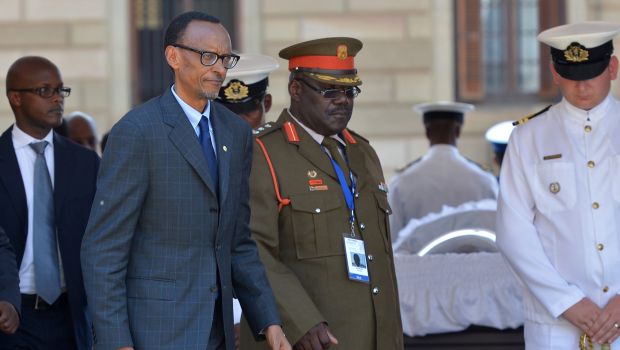
Rwandan President Paul Kagame (2-L) in Pretoria, South Africa, December 13, 2013 (EPA/Alexander Joe).
Johannesburg, AP—Rwanda’s former spy chief has been found dead in a hotel in South Africa, and police said on Thursday they had opened a murder investigation. Opposition leaders immediately accused President Paul Kagame of ordering his assassination.
The opposition coalition Rwandan National Congress said Patrick Karegeya, a former colonel and longtime Kagame ally-in-war who turned against him in peace, was found apparently strangled in a room at Johannesburg’s plush Michelangelo Towers hotel.
A police statement said: “He was found in the hotel room dead on the bed. Preliminary investigations revealed that his neck [was] swollen. A towel with blood and a rope were found in the hotel room safe. There is a possibility that he might have been strangled.”
It said his body was found on Wednesday, New Year’s Day. Congress coordinator Theogene Rudasingwa told The Associated Press in a telephone call from Washington that it was unclear if Karegeya was killed on Tuesday or Wednesday. He said Karegeya’s death followed a pattern of assassinations ordered by Kagame.
Kagame’s government has vehemently denied such charges, though Rwandan exiles say British, US and Belgian law enforcers have frequently warned them that their government is plotting to kill them.
Gunmen twice tried to kill Kagame’s former chief of army staff, Lt. Gen. Faustin Kayumba Nyamwasa, while he was living in exile in Johannesburg in 2010.
Rudasingwa said Karegeya had gone to the Johannesburg hotel to meet a Rwandan man who had posed as a friend of the opposition.
He said he only knew his first name, Apollo, and that the room in which Karegeya was found was registered in his name. The police statement said Karegeya had checked into the hotel in his own name.
“By killing its opponents, the criminal regime in Kigali seeks to intimidate and silence the Rwandan people into submission,” said an opposition statement signed by Rudasingwa. “The regime is hugely mistaken. Such criminal activities make Rwandan people more emboldened to struggle to remove the dictatorship,” he added.
Karegeya and Nyamwasa were among four top former Rwandan army officers who formed an opposition party in exile six years ago.
They had fought with Kagame in the Ugandan rebel movement that brought Yoweri Museveni to power in 1986. Museveni then allowed them bases and training to form their own Tutsi rebel movement.
Kagame’s Rwandan Patriotic Front came to power in 1994, when it ended the genocide in which some 800,000 Tutsis and moderate Hutus were killed.
The four defectors were sentenced in Rwanda in their absence to long prison terms in 2011 for allegedly promoting tribal divisions and threatening state security with grenade attacks in Kigali, Rwanda’s capital.
Rwanda had issued international arrest warrants for the men.
Karegeya, who was 53, according to police, leaves a wife, Leah, who is in Johannesburg, and three children.
Karegeya exercised great power when he served as intelligence chief of Rwanda for ten years before he was arrested and jailed for eighteen months for insubordination and desertion. He fled the country after he was stripped of his rank in 2006.
The defectors, all from Kagame’s Tutsi tribe, accuse Rwanda’s leader of stifling opposition and killing and jailing critics to stay in power and keep out the Hutus who form the majority in Rwanda.
Kagame’s supporters, including the United States and Britain, point to his development achievements. Today, Rwanda has some of the best health, literacy and education rates on the continent, though critics say it has come at the price of dictatorship.
Rudasingwa said international support for Kagame was helping “to put Rwanda on a course for another bloody conflict, but the international community appears to not be interested in preventing another bloodbath in Rwanda.”
